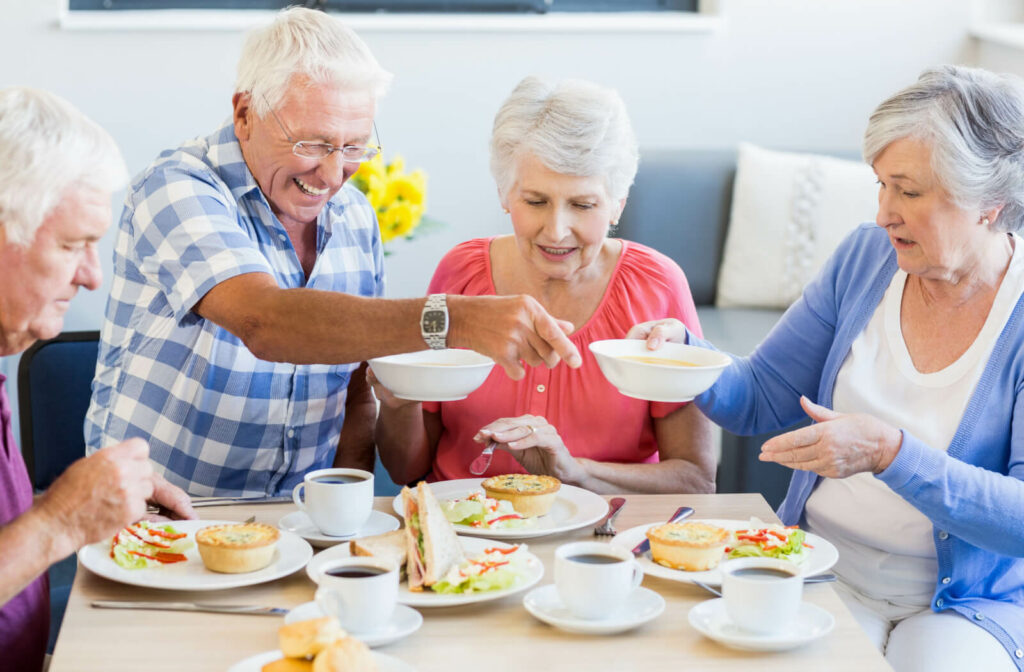As we grow older, it’s perfectly natural for our appetite to change. Foods we once enjoyed may no longer taste the same, or we may find it harder to sit down and finish a full meal. There are quite a few reasons for this to happen—whether due to our metabolism slowing down or taking a new medication, it happens to many people.
To help increase appetite in an elderly loved one, there are a few ways to approach this. You could encourage them to eat with others or join a meal program, as socializing and being around others makes mealtime more enjoyable and stimulating. Eating smaller meals more frequently helps keep your metabolism moving, or adding new spices or flavors can make the meal more interesting. It’s also important to encourage them to drink plenty of water, as this helps improve your appetite as well (and keeps you hydrated!).
If your loved one lives in assisted living, see if there is an option for a social meal plan. Many of these communities offer different services and amenities that can help residents struggling with appetite loss, like different meal times, portion changes, or even by taking a look at if medication could be the cause. Being around others can make their mealtime more entertaining and may help provide the boost they need for their appetite to build again!
Why Does Our Appetite Change as We Get Older?
Our bodies are constantly changing, and your metabolism is no exception—it’s constantly adjusting to accommodate the rest of the body. Muscle mass decreases, hormones adjust, and our physical fitness slows down. The metabolism is constantly making adjustments so that your body processes and receives the energy it needs.
Alongside the metabolic changes, we often need new medication as we age to address new health concerns, and many medications can directly affect both your appetite and your hormones. With so many chemical changes in the body, the appetite tends to take a hit.
The appetite could be slowing down due to any of these reasons, but there’s a simple one as well that should be considered: as we get older, our sense of taste and smell diminishes, and food may just not be as appetizing as it once was.
What Can You Do to Increase a Senior’s Appetite?
Look at Medication
When it comes to increasing a senior loved one’s appetite, the best place to start is to determine why it’s slowed down in the first place. If they’ve recently switched medication, speak with their doctor to see if it could be affecting their appetite—It could be as simple as that.
Encourage Physical Activity
If it isn’t medication, it may be possible to determine what’s causing their appetite concerns. If they used to exercise often but slowed down, it may be their body’s way of telling them that it’s no longer is using all the energy from their metabolism. Staying physically active isn’t just good for your body; it can significantly affect your appetite.
Make Eating a Social Activity
It also may help to try to encourage them to eat more around other people. Organizing dinner plans or encouraging them to join a cooking group could make all the difference in the world. Along with the conversation and sense of community, having other people around makes the meal more stimulating and exciting and could make meals much more interesting!
Encourage Small Meals Throughout the Day
If none of these work, you could also try changing how your loved one eats. Rather than trying to have two or three large meals a day, you can break their meals up into several smaller ones as you see fit. After eating, your metabolism briefly speeds up—this is because your body uses extra calories and energy to digest and process the food you eat.
So by eating smaller meals more often throughout the day and avoiding large portions where possible, you can help your senior loved one’s metabolism speed up and increase their appetite.
Increase Hydration
And the easiest way you can boost your metabolism and increase your appetite, no matter your age? Drink more water!
Staying hydrated helps your body with digestion, flushes out toxins, and helps with almost every single process in your body.
The Importance of Recognizing Appetite Changes in a Loved One
At the end of the day, an appetite change can often be a sign of something else affecting you or a loved one. Medication, fitness levels, and hydration are good starting points to help determine what’s causing the change, but they can’t answer every question about why a person’s appetite may be changing.
It’s important to check in with your loved ones if you’ve noticed a recent appetite change. There may be other problems they could need help with. If they’ve recently begun losing weight or are avoiding meals, it’s important to discuss with them the importance of a healthy appetite and see if they need help.
Support for Your Loved One
Here at Tyler Mills Senior Living, we offer many different meal options so every resident can get what they need for a healthy life. We help every person live a high-quality life, and we know that a healthy appetite is worth focusing on. Schedule a tour today to see for yourself the care we give our residents!



